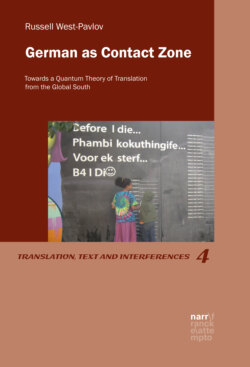Читать книгу German as Contact Zone - Russell West-Pavlov - Страница 20
На сайте Литреса книга снята с продажи.
Language beyond language
ОглавлениеAt first glance, Thoreau’s claim may seem to have little to do with translation. Translation is an operation that takes place between natural (human) languages, and, if we are to accept the culturalists’ extension of the term’s scope, between other practices of culture that have structures similar to that of language. The psychoanalyst, for instance, might be seen as a translator of the unconscious, which, as Lacan (1981: 20) famously claimed, posing as a ‘translator of Freud’, is structured like a language (see also Benjamin 1989). Thoreau is not per se interested in translation. He is, however, interested in boundaries of language and how they can be pushed to the utmost limits of the universe. If the operation of translation crosses borders between languages, and these borders themselves begin to shift—the question is, how far?—then translation may find itself venturing into realms far riskier and unknown than merely those of ‘culture’.
Anthropology is one of the sites where this may happen. Dealing with what were once known as ‘Naturvölker’, ‘nature-peoples’ in the German terminology, anthropology travels close to the borders of the human, not in the sense of the denigration of peoples deemed ‘different’ to us, but rather, in the sense of a recognition of the limitations of the very category of the human itself. An anthropology endowed with a strong sense of self-reflexivity finds itself journeying towards the outer peripheries of the human where natural entities possess personhood and speak (Descola 2005). For this reason, I shall turn in what follows to several anthropological texts. In such an undertaking, translation may thus become a central operating device in the negotiation of borders as we enter territories that were once deemed far beyond the reach of language. Translation may transpire to be a crucial instrument for dissecting and perhaps abducting that soon-to-be-extinct creature known as ‘man’. This, in turn, will have radical consequences for the ways we understand what was once known as language—in particular those zones of speech generally understood as national languages.
This is why the apparently ‘premodern’ traditions of ‘sand stories’ maintained to this day by the Aranda people, and Thoreau’s claim, less dated but also quaint, are nonetheless so radical and revolutionary. This is also why such practices and claims may still be so deeply necessary to any fundamental transformation of ‘the image of Man as a rational animal endowed with language’ (Braidotti 2013: 143), which in turn provides the template for those collective speaking entities that we label nations, with their particular national languages. After the moments of Nietzsche, Darwin, Freud and Saussure, autonomous, intentional, rational man is no longer on the scene. But language remains. In the post-Enlightenment worldview, language is no longer seen as the expression of rational intentions, but rather, as symptoms of irrational desires. The subject no longer expresses himself through language; rather, language as the unconscious now speaks the subject. Dangerously, the national spirit may be what speaks through the language, thereby animating patriotic, even extreme nationalist subjects; language is one site of the violent and atavistic distinction between us and them.
Nonetheless, language, though it is now the master of the human, guarantees by proxy the primacy of the human, because the human being remains a primarily linguistic creature. This proxy character may all too easily fall into the hands of dictatorial regimes: we must beware. The poststructural displacement of language offers little protection against the solipsistic and paranoid micro-languages of social media, nor against populist rhetoric. This is why the task is to displace language as well, to relocate it as one (rather humble) means of communicative exchange among others, opening communication up to a much larger community of actants—and thus of potential political allies—than merely that of humans.
Notions of the hybridity of language, by which language is forcibly opened up to its own multiplicity—as, say, in Herbrechter’s (1999: 311) claim that ‘there is not one language from which one could start translating into another. Language always differs from itself; there is no self-contained (national) language which can remain in a fixed state’—are mere cosmetic adjustments to a fundamental singularity of language. Linguistic pluralism, whether among or within languages, is merely an additive reform to a notion of linguistic exceptionalism; linguistic pluralism may palliate that exceptionalism but will never really transform it. This is because the deep structure of the very notion of the natural language is from the outset predicated upon a set of premises of difference: natural language assumes the idea of its fundamental difference from its environs. Human languages may be admitted as plural, and their nature as hybrid, but language itself is singular and exceptional.
Only when we admit that language itself is part of a tapestry of multifarious and infinitely variegated exchanges extending across the natural world, will it be truly possible to understand what a hybridity of language might really mean. And only then will it be truly possible to establish a notion of contemporary society where language is truly a contact zone, not merely between various human languages, but between human agency and many others. This book focuses on translation as the privileged figure of the moment of exchange, one that is both instantiated and thematized in many translations into and from the German language.
